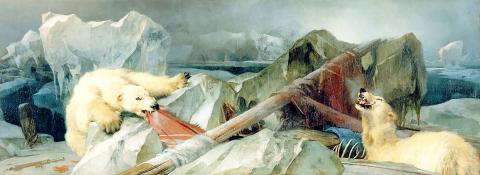Chinese Practice
謀事在人,成事在天
(mou2 shi4 zai4 ren2 cheng2 shi4 zai4 tian1)

Photo: Wikimedia Commons
照片:維基共享資源
planning is with man, accomplishing with heaven
德國神職人員托馬斯‧肯皮斯(約西元一三八○~一四七一年)所著,頗具影響力的天主教靈修書《師主篇》(De Imitatione Christi),原以拉丁文寫成,其中有一句「Homo proponit, sed Deus disponit 」,後來被譯成英文「man proposes, but God disposes」(計劃的是人,但決定的是上帝)──這句話的意思是說,雖然人類可以制定計畫和發想概念,但這些努力成功與否,最終取決於其是否在上帝的計畫內。這也就是說,我們的命運是被更大的一股力量所掌控。
我們也可以用「the best laid plans of mice and men...」(是人是鼠,最好的計畫...)這個歇後語來表達同樣的意思,這半句話接下來是「...often go awry」(經常出差錯)。此語出自蘇格蘭詩人羅伯特‧伯恩斯(西元一七五九~一七九六年)一七八六年所作的詩《致老鼠》,詩中主人公向一隻田鼠道歉,因為他在犁田時,搗亂了那隻田鼠的窩:
可是,老鼠啊,並非只有你,
才能證明,深謀遠慮可能也是枉費心機:
不管是人是鼠,即使是最好的安排設計,
結局也往往出乎意料。
於是留給我們的,只有悲哀和痛苦,
而不是應許的喜悅。
當一件事無論是如何精心策劃,結果還是出了差錯,我們就會說「ah, the best laid plans of mice and men...」(啊,是人是鼠,最好的計畫...)。這也是美國作家約翰‧史坦貝克的小說《人鼠之間》書名的由來。
有個中文諺語,和「man proposes, but God disposes」意義相近──「謀事在人,成事在天」,意思是說,人謀劃事情,但這事最後成功與否,就取決於天命了。
此諺語的之確切出處不可考,但可見於明清的通俗文學而為人所周知,例如《三國演義》(一般認為作者為明末清初的羅貫中)第一○三回:「不期天將大雨,火不能著,哨馬報說司馬懿父子俱逃去了,孔明歎曰:謀事在人,成事在天。不可強也!」(沒想到開始下大雨,火點不著,報信的人說司馬懿父子都逃走了。孔明感嘆道:「謀畫事情的是人,但這事成功與否,要看老天的決定。這是沒辦法強求的!」)
另亦見曹雪芹的《紅樓夢》,在第六回中,劉姥姥說:「這倒不然,謀事在人,成事在天,咱們謀到了,靠菩薩的保佑,有些機會,也未可知。」
另外還有一些常見的說法也有類似的意義,例如「世事難料」、「人算不如天算」、「計畫趕不上變化」等。
(台北時報林俐凱譯)
雖然付出了努力,但成功不是理所當然,所謂謀事在人,成事在天,有很多因素超出我們的掌握。
(Despite the work we’ve put into this, we cannot take success for granted. As they say, man proposes, God disposes. Many factors are out of our hands.)
議員得知競選連任落敗後,表示:「謀事在人,成事在天,我坦然接受結果。」
(Having learned that his reelection bid failed, the councilor said: “Man proposes, God disposes; I accept the result.”)
英文練習
man proposes, god disposes
In his influential Christian book De Imitatione Christi (The Imitation of Christ), originally written in Latin, the German cleric Thomas a Kempis (c. 1380 – 1471) wrote Homo proponit, sed Deus disponit, later translated into English as “man proposes, but God disposes.” The idea is that while humans can devise schemes and ideas, the success of these endeavors ultimately depends on whether they are in God’s plan. That is, our destinies are at the mercy of larger forces.
We might also use the partial phrase “the best laid plans of mice and men...” to invoke the same idea. The full phrase, completed with “...often go awry,” derives from the 1786 poem To a Mouse by the Scottish poet Robert Burns (1759 – 1796), in which his protagonist apologizes to a field mouse after he disturbs its nest while plowing the field it is living in:
“But, Mousie, thou art no thy lane [you aren’t alone]
In proving foresight may be vain:
The best laid schemes o’ mice an’ men
Gang aft a-gley, [often go awry]
An’ lea’e us nought but grief an’ pain,
For promised joy.”
When a plan, no matter how intricately devised, goes wrong, we might say, “ah, the best laid plans of mice and men...” This was also the inspiration for the title of US writer John Steinbeck’s novel Of Mice and Men.
There is a Chinese saying that is very similar in meaning to man proposes, God disposes: 謀事在人,成事在天. It means that people devise plans to achieve something, but in the end the success or failure of the endeavor comes down to fate.
The exact provenance of this saying is unknown, but it appears in vernacular literature during the Ming and Qing dynasties. It crops up, for example, in chapter 103 of the Romance of the Three Kingdoms, generally held to have been written during the late Ming/early Qing by Luo Guanzhong, in which it is written 不期天將大雨,火不能著,哨馬報說司馬懿父子俱逃去了,孔明歎曰:謀事在人,成事在天。不可強也 (the Heavens opened unexpectedly, and a torrent came down. We couldn’t light the fire, and reports came through that Sima Yi and his sons had escaped. Zhuge Liang sighed, saying: men makes their plans, but their success depends on Heaven. We cannot make them happen).
Again, in chapter 6 of the The Dream of the Red Chamber by Cao Xueqin, the character Granny Liu says, 這倒不然,謀事在人,成事在天,咱們謀到了,靠菩薩的保佑,有些機會,也未可知 (not really; however much we plan, it comes down to fate in the end. Now that we’ve got this thanks to Buddha’s blessing, who knows, we might have some opportunities).
There are other common sayings, too, with a similar meaning, such as 世事難料 (nothing is certain), 人算不如天算 (the plans of men are as nothing compared to those of Heaven) and 計畫趕不上變化 (plans cannot keep pace with change).(Paul Cooper, Taipei Times)
Well, that was an utter disaster. The best laid plans of mice and men, as they say...
(噢,這完全是災難一場,所謂人算不如天算。)
Don’t count your chickens before they’re hatched, young man. Man proposes, God disposes.
(年輕人,在小雞孵出來之前不要去計算雞的數目,要知道世事難料。)

US President Donald Trump has renewed his ambition to take control of Greenland for national security reasons and questioned whether Denmark has any legal right to the Arctic island. The debate has revived scrutiny of how Greenland became part of Denmark, its current self-rule and path to independence, and Washington’s military footprint. HOW DID DENMARK GET GREENLAND? Greenland was inhabited by Inuit peoples from Asia and North America intermittently from around 2,500 BC. Around 985 AD, Vikings led by Erik the Red settled in southern Greenland, farming and building churches. Around the same time, ancestors of today’s Inuit arrived, living as hunters

A: In its latest annual travel guide, Bloomberg recommended two restaurants in Taipei: Golden Pig barbeque from South Korea and two-Michelin-star restaurant A. B: Also, tourists should definitely try Taiwanese cuisine while they’re here. Mountain & Sea House, Shin Yeh Taiwanese Cuisine, and Fujin Tree Taiwanese Cuisine & Champagne are good options. A: For local snacks, Fu Hang Soy Milk, Fu-Ba-Wang Pigs’ Knuckles Restaurant, and Wang Ji Rice Dumplings are all very popular. B: And the gold medalists of the 2025 Taipei International Beef Noodle Festival — Yun Shui Kitchen, The Howard Plaza Hotel Taipei, and Come N’ Eat

A: Bloomberg just released its annual travel guide, titled “25 Best Places to Travel in 2026.” What were the best Asian destinations? B: There were actually six Asian hotspots: Taiwan’s Taipei, Malaysia’s Penang, Kazakhstan’s Almaty, Indonesia’s Rote Island, India’s Tiger Reserves, and Oman. A: With its mix of traditional food and modern cuisine, Taipei has become a rising food capital in Asia. B: As Bloomberg reported, “Taiwan is a place that bubbles up in culinary conversation because of its famed beverage, bubble tea, and its early adoption of modern night markets.” A: And Din Tai Fung has now

Owls have long fascinated people with their distinctive appearance and mysterious habits. These nocturnal birds possess large, round eyes and a flat facial disc. Their feathers come in shades of brown, gray, or white, helping them blend easily into the darkness. The most remarkable trait of owls is that they can turn their heads without damaging blood vessels. Contrary to popular belief, they can only rotate their heads up to 270 degrees, not 360 degrees. Owls have 14 cervical vertebrae, which is twice as many as humans. This special physical structure compensates for their inability to move their eyes within their